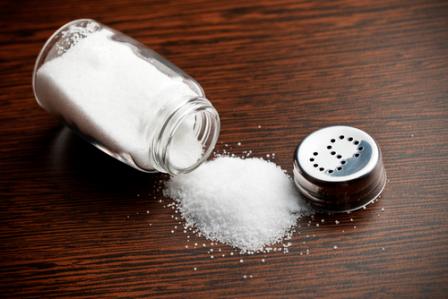How Much Salt Do You Need to Be Healthy?
Are there benefits to higher sodium diets?
Monica Reinagel, MS, LD/N, CNS
Listen
How Much Salt Do You Need to Be Healthy?

“Lately I’ve been hearing that a diet that’s too low in salt might be just as bad as one that’s too high. How much sodium should you eat each day?”
Getting people to reduce their sodium has been a major priority for our public health agencies over the years. Last year, New York City even passed legislation that would require restaurants to post warnings next to menu items that are considered high in sodium.
And yet, earlier this year, researchers published a review of existing studies in which they found that following a low sodium diet actually increased the risk of heart attack and stroke, both in people with high blood pressure as well as people with normal blood pressure.
See also: Why Can’t Experts Agree on Sodium?
What Is the Right Amount of Sodium for a Healthy Diet?
A certain amount of sodium is essential for your health. The Food and Nutrition Board of the Institute of Medicine says that moderately active adults need about 1,500 mg of sodium per day. But this is based both on the amount of sodium you lose every day through perspiration, as well as the amount of sodium you need to eat in order to get enough of other minerals that generally “ride along” with sodium in foods.
For example, iodized salt is the primary source for iodine in the American diet. So restricting salt too much (or using un-iodized salt) could lead to iodine deficiency.
See also: Could Cutting Back on Salt Lead to Thyroid Problems?
Assuming that intake of other minerals is sufficient, the amount of sodium it would take to prevent an actual sodium deficiency is probably closer to 500 to 1,000 mg, depending on how active you are and how much you sweat. People who engage in very strenuous exercise or spend time in very hot conditions may need considerably more sodium to replace what’s lost through perspiration.
See also: What Are Electrolytes?
Where Is Sodium Found?
Packaged and prepared foods, including the meals we eat in restaurants, account for about 75% of the sodium in a typical diet. Salty snacks like potato chips may seem like an obvious source but others are less so. Surprisingly, commercially prepared breads and cereals are one of the primary sources of sodium in the American diet!
But even if you eat absolutely no packaged or prepared foods and use no salt in your cooking, you almost certainly get 500 mg of sodium per day. Fruits, vegetables, grains, legumes, dairy products, nuts, seeds, and other whole foods all contain enough naturally occurring sodium to meet the body’s minimum requirements.
But are there benefits to higher sodium diets that we’ve been overlooking?
For decades, health officials have been telling us to limit sodium to 2400 mg per day, or 1,500 mg if you have high blood pressure. (Ironically, the recommended minimum for sodium is exactly the same as the recommended maximum for people with high blood pressure!) Meanwhile, the typical American takes in about 3,500 mg per day. And maybe that’s not the public health disaster that everyone seems to think it is.
In this recent study, researchers found that people who consumed less than 3,000 mg of sodium per day actually had more cardiovascular events than people who consumed 4,000 to 5,000 mg per day.
For the record, I’m not proposing that we increase the recommended intake for sodium. Not on the basis of this analysis, anyway. But I do think that the single-minded focus on limiting sodium is misguided. As I’ve talked about before, the balance between sodium and potassium appears to be more important than the amount of sodium in the diet. But I also think we need to back the lens up and look at the whole diet instead of one isolated nutrient
Eat Foods, Not Nutrients
If you eat lots of highly processed foods, your diet may be quite high in sodium. But I’m not at all sure that the sodium content is the biggest problem with a diet that’s mostly processed foods.
By the same token, if a decent proportion of your meals and calories are coming from fresh whole foods, your sodium intake is probably going to be a lot lower. But the health advantages of such a diet probably have less to do with the sodium content and more to do with the overall nutrient density of that diet. And if you like to season your fresh whole foods with a healthy sprinkle of salt, I think that’s probably better for you than a diet of highly processed low-sodium foods.
So, here’s the answer to your question, Katherine: Unless you engage in a lot of strenuous exercise (or have a medical condition), you probably don’t need to worry about whether you’re getting enough sodium. And as long as your diet includes plenty of fresh, whole foods, you can probably season them to taste without worrying about over doing it.
For those with high blood pressure or whose doctors have put them on low sodium diets for other reasons, I don’t want you to disregard your doctor’s advice based on this podcast. But these recent study results certainly provide an opener for an interesting conversation at your next appointment. In the meantime, here are some ideas for enhancing flavor without adding a lot of sodium.
Image courtesy of Shutterstock.

